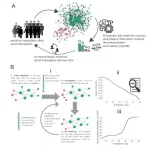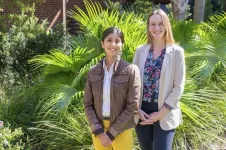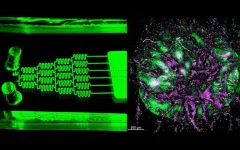(Press-News.org) The work provides novel genetic insights into dietary preferences and opens the possibility of targeting SI to selectively reduce sucrose intake at the population level.
The study was led by Dr. Peter Aldiss, now a group leader in the School of Medicine at the University of Nottingham, alongside Assistant Professor Mette K Andersen, at the Novo Nordisk Foundation Centre for Basic Metabolic Research in Copenhagen and Professor Mauro D’Amato at CIC bioGUNE in Spain and LUM University in Italy. It also involves scientists internationally from Copenhagen, Greenland, Italy and Spain as part of the ‘Sucrase-isomaltase working group’.
Dr Aldiss said: “Excess calories from sugar are an established contributor to obesity and type 2 diabetes. In the UK, we consume 9-12% of our dietary intake from free sugars, such as sucrose, with 79% of the population consuming up to three sugary snacks a day. At the same time, genetic defects in sucrose digestion have been associated with irritable bowel syndrome, a common functional disorder affecting up to 10% of the population.
“Now, our study suggests that genetic variation in our ability to digest dietary sucrose may impact not only how much sucrose we eat, but how much we like sugary foods.”
The team of experts began by investigating the dietary behaviours in mice lacking the SI gene. Here, mice developed a rapid reduction in sucrose intake, and preference. This was confirmed in two large population-based cohorts involving 6,000 individuals in Greenland and 134,766 in the UK BioBank.
The team took a nutrigenetics approach to understand how genetic variation in the SI gene impacts sucrose intake and preference in humans. Strikingly, individuals with a complete inability to digest dietary sucrose in Greenland consumed significantly less sucrose-rich foods whilst individuals with a defective, partially functional SI gene in the UK, liked sucrose-rich foods less.
“These findings suggest that genetic variation in our ability to digest dietary sucrose can influence our intake, and preference, for sucrose-rich foods whilst opening up the possibility of targeting SI to selectively reduce sucrose intake at the population level,” says Dr Aldiss.
“In the future, understanding how defects in the SI gene act to reduce the intake, and preference, of dietary sucrose will facilitate the development of novel therapeutics to help curb population-wide sucrose intake to improve digestive and metabolic health.”
END
Could a genetic flaw be the key to stopping people craving sugary treats?
2024-11-13
ELSE PRESS RELEASES FROM THIS DATE:
Experts urge complex systems approach to assess A.I. risks
2024-11-13
[Vienna, November 13, 2024] — With artificial intelligence increasingly permeating every aspect of our lives, experts are becoming more and more concerned about its dangers. In some cases, the risks are pressing, in others they won't emerge until many months or even years from now. Scientists point out in The Royal Society’s journal that a coherent approach to understanding these threats is still elusive. They call for a complex systems perspective to better assess and mitigate these risks, particularly in light of long-term uncertainties and complex interactions between A.I. and society.
"Understanding the risks of A.I. requires recognizing the intricate interplay ...
Fossil fuel CO2 emissions increase again in 2024
2024-11-13
Global carbon emissions from fossil fuels have reached a record high in 2024, according to new research by the Global Carbon Project science team.
The 2024 Global Carbon Budget projects fossil carbon dioxide (CO 2) emissions of 37.4 billion tonnes, up 0.8% from 2023.
Despite the urgent need to cut emissions to slow climate change, the researchers say there is still “no sign” that the world has reached a peak in fossil CO2 emissions.
With projected emissions from land-use change (such as deforestation) of 4.2 billion tonnes, total CO2 emissions are projected to be 41.6 billion tonnes in 2024, up from 40.6 billion tonnes last year.
Over the last 10 years, fossil ...
Winners of Applied Microbiology International Horizon Awards 2024 announced
2024-11-13
The winners of the Applied Microbiology International Horizon Awards 2024 have been announced.
The prizes, awarded by the learned society Applied Microbiology International (AMI), celebrate the brightest minds in the field and promote the research, group, projects, products and individuals who continue to help shape the future of applied microbiology.
The One Health Microbiome Center at Penn State has been named as this year’s winner of the WH Pierce Global Impact in Microbiology Prize 2024.
This award acknowledges and celebrates individuals, teams, or organisations that have made groundbreaking contributions to global challenges through applied microbiology.
The One Health Microbiome ...
A toolkit for unraveling the links between intimate partner violence, trauma and substance misuse
2024-11-12
The opioid crisis has left an estimated 2.5 million people 18 and older in the U.S. with opioid use disorder, or OUD. Despite increased attention to the heavy toll taken by OUD, key risk factors such as intimate partner violence (IPV) and post-traumatic stress disorder (PTSD) are often overlooked. Both increase the risk of OUD and complicate recovery efforts.
A team of MUSC researchers led by clinical psychologists Amber Jarnecke, Ph.D., and Tanya Saraiya, Ph.D., both of the Department of Psychiatry and Behavioral ...
Can everyday physical activity improve cognitive health in middle age?
2024-11-12
HERSHEY, Pa — Exercise has been shown to improve brain health and reduce the risk of cognitive decline and dementia over the long-term. But engaging in everyday physical activity has immediate benefits for brain health, according to a new study from researchers in the Penn State College of Medicine.
The team found that middle-aged people who participated in everyday movement showed improvement in cognitive processing speed equivalent to being four years younger, regardless of whether the activity was lower intensity, like walking the dog or doing household chores, or higher intensity, like jogging.
The findings were published ...
Updated guidance reaffirms CPR with breaths essential for cardiac arrest following drowning
2024-11-12
Updated Guideline Highlights:
The American Heart Association and the American Academy of Pediatrics update recommendations for untrained lay rescuers and trained rescuers resuscitating adults and children who have drowned.
One important update is the recommendation to provide cardiopulmonary resuscitation (CPR) with rescue breaths and chest compressions to all persons in cardiac arrest following drowning after removal from the water.
The updated recommendations for resuscitation following drowning are, for the first time, well codified, accompanied ...
Study reveals medical boards rarely discipline physician misinformation
2024-11-12
Despite increased concerns about doctors spreading false medical claims during the COVID-19 pandemic, medical boards rarely take disciplinary action against physicians for spreading misinformation, according to a new study by Richard S. Saver, Arch T. Allen Distinguished Professor of Law at the University of North Carolina School of Law and Professor in the Department of Social Medicine at the UNC School of Medicine, published in JAMA Network Open.
Through analysis of over 3,100 medical board disciplinary proceedings across the nation’s five most populous states, Saver found that spreading misinformation to the public was the least common reason for ...
New treatment helps children with rare spinal condition regain ability to walk
2024-11-12
BALTIMORE, November 12, 2024— Researchers at Kennedy Krieger Institute’s International Center for Spinal Cord Injury (ICSCI) have made a remarkable advancement in treating children with Acute Flaccid Myelitis (AFM), a rare but severe neurological condition that causes sudden paralysis.
A new study, published in the journal Children, demonstrates that a combination of Transcutaneous Spinal Cord Stimulation (TSS) and movement training can help children with AFM improve their ability to walk. TSS is a non-invasive therapy ...
'Grow Your Own' teacher prep pipeline at the University of Louisiana at Lafayette funded by US Department of Education
2024-11-12
A new teacher prep initiative from the University of Louisiana at Lafayette’s College of Education & Human Development received a $3.1 million grant from the U.S. Department of Education’s Teacher Quality Partnership grant program to establish and strengthen a Grow Your Own Network across Acadiana.
This initiative, designed to address teacher shortages in the south-central region of Louisiana, will build a regional network connecting local school districts with higher education institutions ...
Lab-grown human immune system uncovers weakened response in cancer patients
2024-11-12
To better understand why some cancer patients struggle to fight off infections, Georgia Tech researchers have created tiny lab-grown models of human immune systems.
These miniature models — known as human immune organoids — mimic the real-life environment where immune cells learn to recognize and attack harmful invaders and respond to vaccines. Not only are these organoids powerful new tools for studying and observing immune function in cancer, their use is likely to accelerate vaccine development, better predict disease treatment response for patients, and even speed up clinical trials.
“Our synthetic ...




